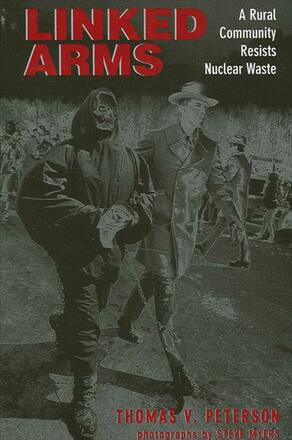
Linked Arms
A Rural Community Resists Nuclear Waste
Alternative formats available from:
Shows how a rural group used civil disobedience to defy the nuclear industry and governmental authority, preventing the building of a nuclear dump in western New York.
Description
Through character development, snappy dialogue, and vivid scenes, Linked Arms tells the story of a rural people's successful struggle to keep a major nuclear dump out of Allegany County in western New York. Five times over a twelve-month period hundreds of ordinary people—merchants, teachers, homemakers, professionals, farmers, and blue collar workers—ignored potential jail terms and large fines to defy the nuclear industry and governmental authority by linking arms in the bitter cold to thwart the siting commission through civil disobedience.
The hearts and minds of the resisters emerge in the narrative, as we find out why these people found civil disobedience compelling, how they organized themselves, and what moral dilemmas they addressed as they fought for their convictions. While becoming more engaged in the resistance, they confronted critical issues in contemporary America: democratic decision making, environmental policy, legal rights, corporate responsibility, and the technology of nuclear waste.
Some of the book's highlights include: conversations that took place between Governor Cuomo, Assemblyman Hasper, and the protestors, which thoughtfully probe who should bear the financial burden of a failed and dangerous technology; the scientific and technological issues discussed between Ted Taylor, a nuclear physicist who was one of the key people in the Manhattan project, and the leaders of the resistance; and the citizens' initiation of a lawsuit that eventually reached the Supreme Court and abrogated the central provision in the 1987 congressional law that mandated states build low-level nuclear dumps across the country. These dialogues and vignettes illustrate how the civil disobedience and dogged determination of the people of Allegany County changed the course of history.
Thomas V. Peterson is Professor of Religious Studies at Alfred University and the author of Ham and Japheth: The Mythic World of Whites in the Antebellum South.
Reviews
"Linked Arms offers some important information to its readers in an uncommonly convincing way: the true story. The issue of nuclear power and nuclear waste disposal is a crucial topic in itself, but the subject of citizen and community activism is the real issue being presented here, and its importance is even greater than the specific issue around which it centers. It is the story of people making a difference, 'doing' democracy, if you will, working unbelievably hard, but knowing the exhilaration of work done in collaboration with neighbors, friends, and others who share the bond of caring for one another and their place. This is a model for the way we need to be working with one another in any venue, no matter the particular struggle." — Virginia W. Rasmussen, The Program on Corporations, Law and Democracy
"This is an important documentation that nonviolence can be effective when citizens confront a major threat to themselves and their environment. It also demonstrates that a large and heterogeneous group of citizens can make important decisions through the consensus procedure without formal hierarchies of power." — Roland Warren, coeditor of New Perspectives on the American Community